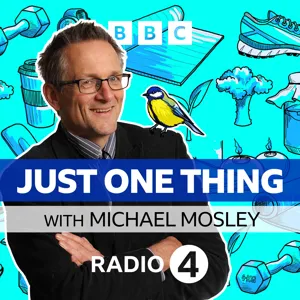Podcast Summary
Maintaining muscle mass through resistance training benefits health and youthfulness: Doing daily press ups and squats can stimulate stem cell production, improve memory, sleep, waistline, appearance, and potentially extend life
Maintaining muscle mass through resistance training is essential for preserving health and youthfulness as we age. This simple and effective practice can improve memory, sleep, waistline, appearance, and potentially even extend life. According to doctor Michael Mosley from the BBC Radio 4 podcast "Stay Young," doing exercises like press ups and squats every day can stimulate the production of regenerating stem cells, protecting muscle fibers from aging and injury. Shirley Webb, a champion weightlifter who started training in her seventies, shares her experience of regaining energy and vitality through strength training. Before starting, she struggled with daily activities and lacked motivation. Now, she encourages everyone, regardless of age, to prioritize resistance exercises for a healthier, more youthful body.
Discovering Hidden Strengths in Late Age: Weightlifting in late age can lead to increased muscle mass, strength, improved brain function, better sleep, and reduced belly fat.
It's never too late to start exercising and seeing the benefits, even in your late seventies. Shirley's story is a testament to this. She began weightlifting after her granddaughter encouraged her to join the gym, and was surprised to find herself lifting more weights than expected. Her trainer noticed her potential and started her on a weightlifting program. The young gym-goers were impressed, and Shirley went on to enter weightlifting championships and even set a world record. The benefits of weightlifting extended beyond physical strength; Shirley reported feeling fantastic, with improved memory, executive function, better sleep, and reduced belly fat. Research supports these findings, showing that resistance training can increase muscle mass and strength, boost brain function, improve sleep quality, and target belly fat. So, regardless of age, embracing resistance training can lead to significant improvements in overall health and well-being.
Strengthen muscle-nerve connections and protect muscle fibers with resistance training: Resistance training can help older adults maintain muscle mass, improve muscle-nerve connections, and reduce the risk of chronic diseases like prediabetes, heart disease, and cancer.
Building muscle through resistance training is not only beneficial for physical appearance and feeling younger, but it also has significant health advantages. As we age, muscle fibers get smaller and the number of muscle fibers decreases due to weakened muscle-nerve connections. Resistance training, specifically targeting type 2 muscle fibers, can help strengthen these connections and protect muscle fibers from being lost. A study on older men showed that 16 weeks of supervised resistance training stimulated the muscle nerve connection, and real-life studies suggest that regular exercise can have similar effects. This rejuvenation at the cellular level can lead to a reduction in the risk of prediabetes, heart disease, and cancer.
Exercise preserves muscle stem cells for muscle regeneration: Regular exercise, including weight training, preserves muscle stem cells and improves muscle health, delaying biological aging and promoting overall well-being
Regular exercise not only improves muscle growth and repair but also preserves muscle stem cells, which are crucial for muscle regeneration. Without muscle stem cells, muscle injury results in zero regeneration. An inactive lifestyle may lead to accelerated aging, making it essential to adopt an active lifestyle as early as possible. While activities like walking, running, cycling, and doing squats and push-ups are beneficial, incorporating weight training using gym equipment or at-home weights can further enhance muscle health and delay biological aging. It's never too late to start exercising, and even small improvements can lead to significant benefits. Regular exercise not only improves overall health and well-being but also potentially prevents or slows down some negative changes associated with aging.
Incorporating resistance training and learning world history, simple ways to enhance health and knowledge: Embrace resistance training for better health and aging, learn from experts on 'You're Dead to Me', and show appreciation with thoughtful gifts from 1-800-Flowers
Incorporating resistance training into your lifestyle, whether through simple exercises like squats and push ups or through professional guidance at a gym, can contribute to looking, feeling, and thinking younger. It's a simple yet effective way to make a positive change for your health and wellbeing. Additionally, the radio show "You're Dead to Me" offers a fun and engaging way to learn about world history, with each episode featuring a top historian and a comedian in a lighthearted and informative conversation. This Mother's Day, consider giving back to the special moms in your life with thoughtful gifts from 1-800-Flowers. And for your next trip, consider Quince for stylish and ethically-made travel essentials at affordable prices.




